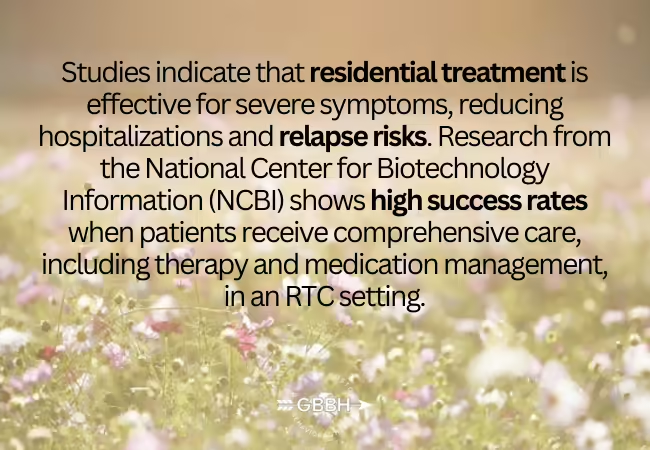When facing persistent or severe mental health challenges, finding the appropriate level of care is essential. For many individuals, traditional outpatient care may not provide the structure and intensity needed to address their mental health needs fully. In these cases, a Residential Treatment Center (RTC) can offer the comprehensive support necessary to foster lasting recovery. At Greater Boston Behavioral Health, we guide individuals and families in evaluating whether a residential program or another mental health treatment program is the best fit for their situation.
What Is a Residential Treatment Center?
A Residential Treatment Center (RTC) is a live-in healthcare facility designed to treat individuals dealing with mental health issues, substance use disorders, or co-occurring conditions. It provides a structured environment where clients can focus exclusively on their recovery without the distractions or stressors of everyday life.
Core Features of RTCs:
- 24/7 Supervision and Support: Mental health professionals are always available to provide care and crisis intervention.
- Individualized Treatment Plans: Each client receives a tailored plan addressing their unique needs and goals.
- Evidence-Based Therapies: Modalities like Cognitive-Behavioral Therapy (CBT) and Dialectical Behavior Therapy (DBT) are commonly utilized.
- Therapeutic Community: Clients benefit from peer support in a group setting, fostering shared understanding and encouragement.
Benefits of Residential Treatment Centers
1. Intensive and Consistent Care
RTCs provide a highly structured daily routine that helps stabilize emotions and behaviors, offering a solid foundation for healing.
2. Holistic Approach to Mental Health
In addition to therapy, RTCs often include wellness activities like mindfulness, physical exercise, and nutrition education to address mental health from multiple angles.
3. Safe and Supportive Environment
For individuals struggling with safety concerns or external triggers, RTCs create a controlled environment that minimizes risk and distractions.
4. Comprehensive Recovery Focus
By living on-site, clients can engage fully in their recovery, participating in a variety of therapies, skills training, and recreational activities designed to improve overall well-being.
When to Consider a Residential Treatment Center
Residential treatment is often recommended when other levels of care, such as outpatient therapy, do not adequately address an individual’s needs. You might consider an RTC if:
- Severe Symptoms Persist: Conditions such as major depression, anxiety disorders, or trauma significantly impair daily life despite previous treatment efforts.
- Safety Concerns: Thoughts of self-harm, suicidal ideation, or inability to maintain personal safety in an unstructured environment.
- Co-Occurring Disorders: The combination of mental health challenges and substance use disorders requires integrated treatment.
- Outpatient Care Isn’t Enough: Programs like Intensive Outpatient Programs (IOP) or Partial Hospitalization Programs (PHP) haven’t provided sufficient progress.
Types of Therapies Offered at Residential Treatment Centers
Residential treatment centers offer a wide range of evidence-based therapies tailored to meet individual needs. These therapies include:
- Cognitive-Behavioral Therapy (CBT): Helps individuals identify and change negative thought patterns to improve emotional regulation and behavior.
- Dialectical Behavior Therapy (DBT): Focuses on building skills for emotional regulation, distress tolerance, and interpersonal effectiveness, particularly for individuals with intense emotions.
- Group Therapy: Provides peer support and shared experiences that foster community and understanding.
- Family Therapy: Addresses family dynamics and promotes healing within the household.
- Holistic Therapies: Includes mindfulness, yoga, and art therapy to support emotional and physical well-being.
Alternatives to Residential Treatment Centers
While RTCs offer unparalleled support for individuals requiring intensive care, not everyone needs this level of treatment. For those seeking flexibility, outpatient care options provide structured support without requiring clients to live on-site.
1. Intensive Outpatient Program (IOP):
- Designed for individuals who need structured therapy but can manage their daily responsibilities.
- Typically involves several therapy sessions per week, focusing on evidence-based treatments like CBT and DBT.
2. Partial Hospitalization Program (PHP):
- A step below residential care, PHP provides intensive day treatment while allowing clients to return home each evening.
- Offers comprehensive therapy and medical support for individuals transitioning from RTCs or seeking an alternative to inpatient care.
3. Outpatient Mental Health Therapy Programs:
- Flexible, personalized care tailored to specific mental health challenges such as anxiety, depression, or trauma.
- Ideal for individuals with mild to moderate symptoms who can function independently.
Challenges of Choosing Residential Treatment
While residential treatment offers many benefits, deciding to enter such a program can be challenging. Common obstacles include:
- Cost: Residential treatment can be expensive, but many facilities accept insurance or offer financial assistance to ease the burden.
- Time Commitment: Programs often require weeks or months of dedicated time, which may impact personal and professional responsibilities.
- Emotional Adjustment: Moving into a new environment and confronting mental health challenges can feel overwhelming at first.
- Stigma: The perception of seeking intensive mental health care can deter individuals from taking the necessary steps.
Questions to Consider Before Choosing a Residential Treatment Center
Choosing the right treatment program is a deeply personal decision. Consider the following questions to determine whether a residential program is right for you or a loved one:
- Are you struggling to manage symptoms despite outpatient care?
- Do you need a structured, distraction-free environment to focus on recovery?
- Are safety concerns or co-occurring disorders complicating your progress?
- What types of therapies and activities does the RTC offer?
- Does the center provide aftercare or step-down programs to support ongoing recovery?
Challenges of Residential Treatment
While RTCs offer significant benefits, they also come with challenges, including:
- Time Commitment: Extended stays may disrupt work, school, or family obligations.
- Cost: Residential programs can be expensive, though insurance may cover part or all of the cost.
- Emotional Adjustment: Being away from home can be emotionally difficult, particularly at the start of treatment.
These challenges can often be mitigated with proper planning and a strong support system, making RTCs a life-changing step for many.
Why Greater Boston Behavioral Health Is Your Trusted Choice
At Greater Boston Behavioral Health, we provide compassionate, evidence-based care tailored to meet each client’s unique needs. Whether you require a residential program or a less intensive option, our team of mental health professionals is here to help.
Our Services Include:
- Comprehensive Mental Health Treatment Programs designed to address a wide range of conditions.
- Evidence-based therapies, including Cognitive-Behavioral Therapy (CBT) and Dialectical Behavior Therapy (DBT).
- Flexible care options such as IOP and PHP, offering robust support without the need for overnight stays.
- A dedicated team of clinicians committed to fostering long-term wellness.
Take the First Step Toward Recovery
Deciding on the right treatment program can feel overwhelming, but you don’t have to navigate it alone. At Greater Boston Behavioral Health, we’re here to guide you every step of the way. Call us at (888)278-0716 today to learn more about our services and how we can help you on your journey to recovery!
Conclusion
Residential treatment centers offer a lifeline for individuals struggling with severe mental health challenges. By providing intensive, evidence-based therapies in a supportive environment, they pave the way for lasting recovery. If you or a loved one is considering residential care, don’t let fear or stigma hold you back. At Greater Boston Behavioral Health, we’re here to guide you every step of the way, ensuring you have the resources and support you need to thrive.
FAQs on Is Residential Treatment the Right Choice
What is a residential treatment center (RTC)?
A residential treatment center is a facility that provides 24/7 care in a structured environment. It offers intensive mental health treatment, including therapy, medication management, and holistic support.
Who can benefit from residential treatment?
Individuals experiencing severe mental health symptoms, co-occurring disorders, or a lack of progress in outpatient programs can benefit from residential treatment.
What types of therapies are offered at residential treatment centers?
RTCs offer evidence-based therapies such as Cognitive-Behavioral Therapy (CBT), Dialectical Behavior Therapy (DBT), group therapy, family therapy, and holistic therapies like mindfulness and art therapy.
How does residential treatment compare to outpatient programs?
Residential treatment provides 24/7 care in a controlled environment, while outpatient programs like Intensive Outpatient Programs (IOPs) and Partial Hospitalization Programs (PHPs) offer flexibility and are suited for individuals with less severe symptoms.
What challenges should I expect when considering residential treatment?
Challenges include cost, time commitment, emotional adjustment, and overcoming stigma. Many centers, including Greater Boston Behavioral Health, offer financial and emotional support to ease these challenges.
How can I prepare for transitioning out of residential treatment?
Work with your treatment team to create a comprehensive aftercare plan, which may include IOPs, PHPs, therapy sessions, and support groups to maintain progress.


